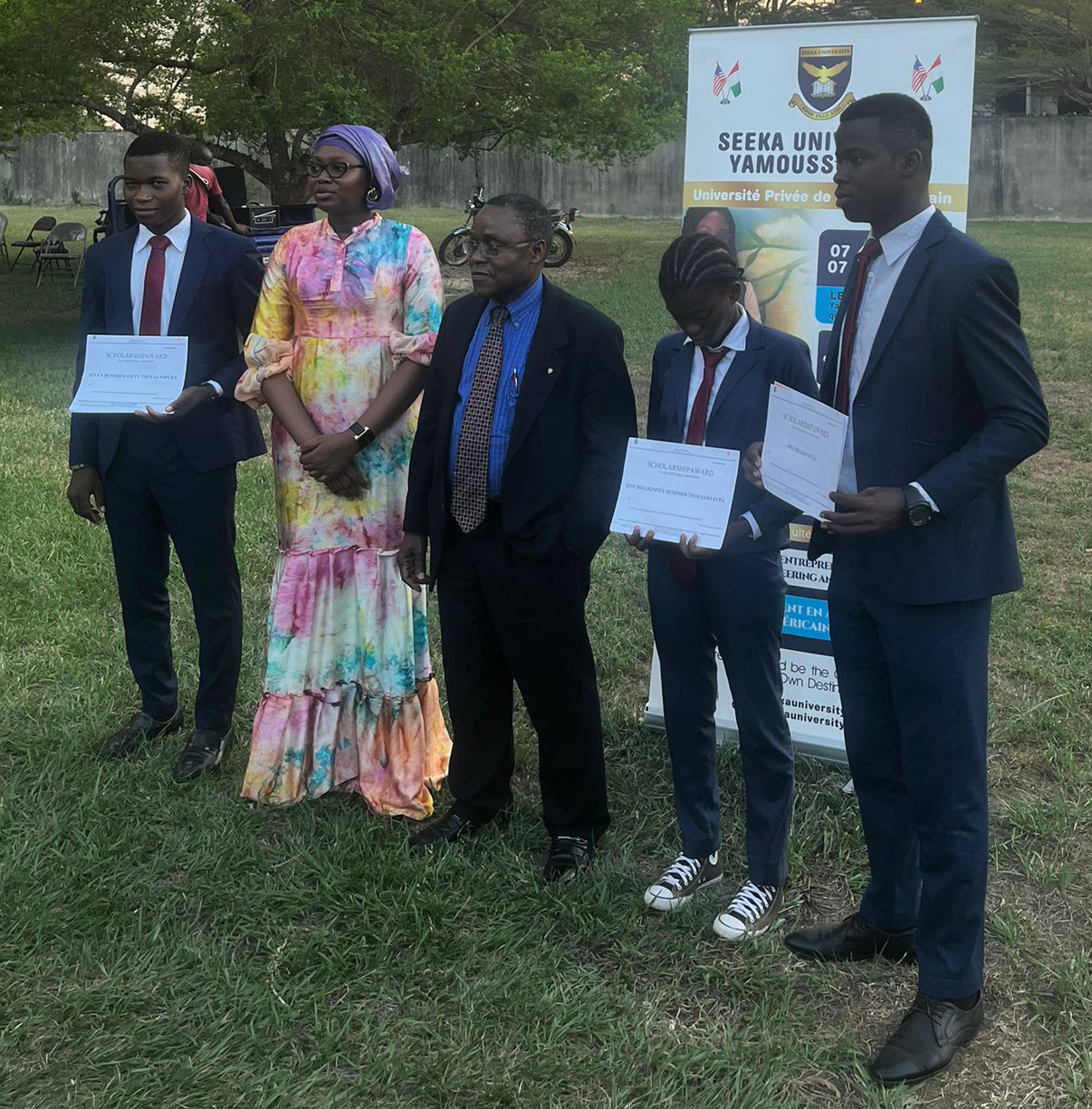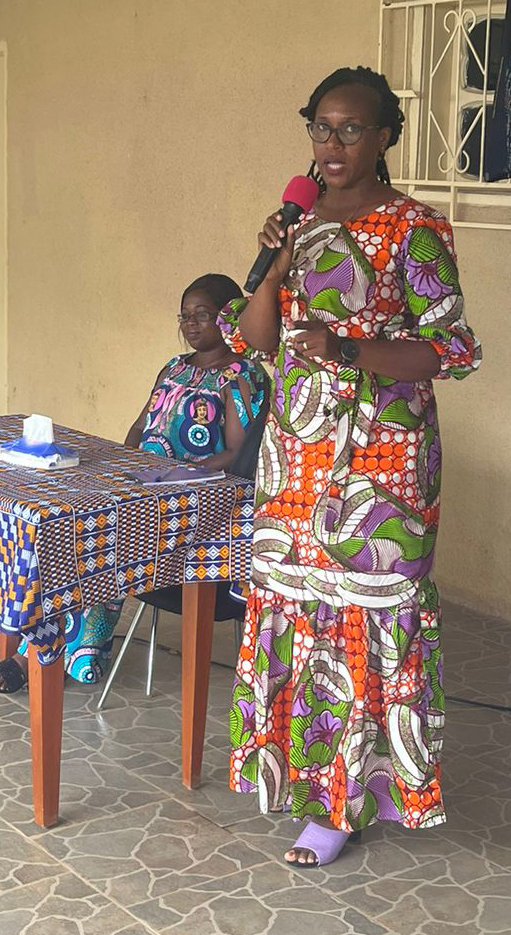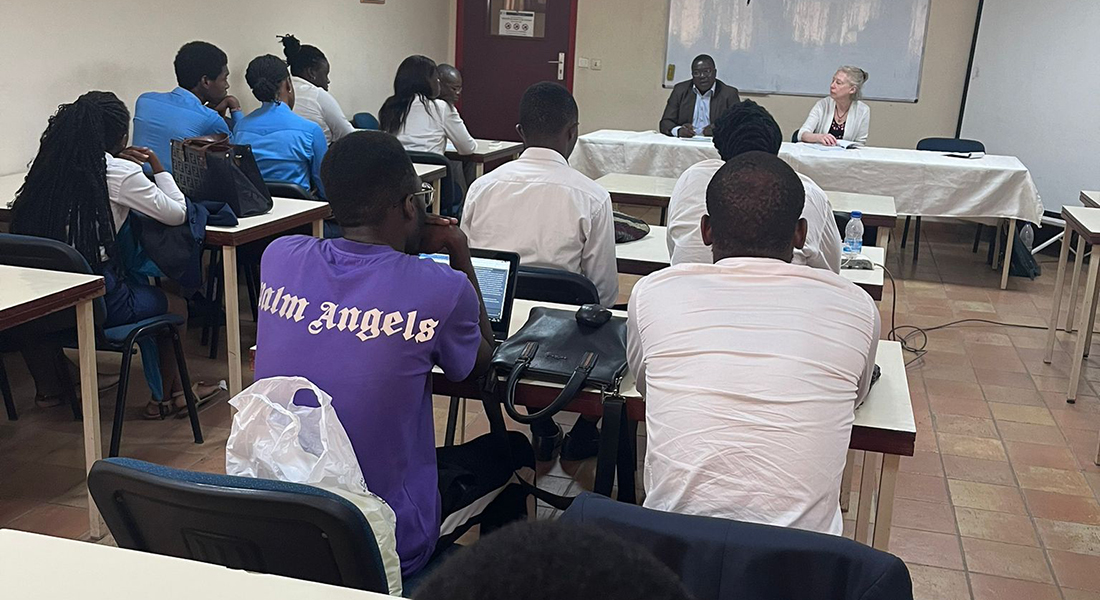Like many big ideas, it all started with a conversation.
“I’d been thinking for a while about how we might be able to get our students engaged more directly in the Global South, and then I was talking with Jaimie Bleck, who would be in Côte d’Ivoire for the year as a Fulbright Scholar and making her own connections with various universities there,” shared Holly Rivers, associate director of the Kellogg Institute, who manages the institute’s student programs. “Things just clicked. The more we talked about how her connections could benefit students here and what we might be able to do in Côte d’Ivoire, the more excited we became.”
“Côte d’Ivoire has a large Catholic population, and it’s among the top countries from Francophone Africa sending students to the United States,” said Bleck, a Kellogg faculty fellow and associate professor of political science. “And with Notre Dame’s university-wide efforts to build connections in Africa, it seemed like an ideal place to look at the kinds of exchanges we were discussing, especially for students interested in Francophone Africa.”
That conversation in the fall grew to more pointed brainstorming about what the possibilities might be for Notre Dame undergraduates.
Bleck, who is also a concurrent professor with the Keough School of Global Affairs and senior research advisor for the Ford Program in Human Development Studies and Solidarity, was preparing to be a Fulbright Scholar for the 2022-23 academic year in Ivory Coast. In part through help from Kellogg PhD Fellow Rasheed Ibrahim, the connections she ended up developing were fruitful indeed: While working on her project to finish a book manuscript, she also ended up being a visiting professor at the Jesuit University/CERAP where she taught two Masters-level classes on research methodology and also gave classes at the African School of Economics – both in Abidjan. She also coordinated events with Seeka University in Yamoussoukro. She began exploring possibilities with her contacts there and considered what initial connections with students could be made.
These university connections and conversations laid the foundation for some exploratory opportunities.
 “Notre Dame’s annual student-led Human Development Conference – which has had a virtual component since COVID – seemed a good way to engage Seeka University students and their research with their counterparts here,” explained Rivers. “So we decided to first hold a networking conference in French the week prior, to connect the students, and then the Seeka students participated in the conference virtually. Both opportunities were highly successful and very well received.” Students from Seeka University, Notre Dame, and the African School of Economics all participated in an online exchange about various topics related to human development. Bleck helped to coordinate from Yamoussoukro and Rivers, Beugre, and Bassirou Chitou (dean of the African School of Economics in Abidjan) participated online.
“Notre Dame’s annual student-led Human Development Conference – which has had a virtual component since COVID – seemed a good way to engage Seeka University students and their research with their counterparts here,” explained Rivers. “So we decided to first hold a networking conference in French the week prior, to connect the students, and then the Seeka students participated in the conference virtually. Both opportunities were highly successful and very well received.” Students from Seeka University, Notre Dame, and the African School of Economics all participated in an online exchange about various topics related to human development. Bleck helped to coordinate from Yamoussoukro and Rivers, Beugre, and Bassirou Chitou (dean of the African School of Economics in Abidjan) participated online.
Constant Beugre, a professor at Delaware State University and the founder and president of Seeka University, was instrumental in planning their students’ participation in the events, and ensured that university dignitaries were there to observe the students presenting their research and the various interactions.
A major exploratory opportunity would follow.
Sponsored by Kellogg with the support of a Pamoja Capacity Exchange grant, Rivers traveled to Ivory Coast in the spring to visit with Bleck and representatives from the three universities for more formal planning of expanded opportunities.
“It was a whirlwind week, but we got so much accomplished and really sparked a lot of enthusiasm for future endeavors,” said Rivers, explaining that the visit included meetings at all three universities.
 Their Seeka itinerary included participation in a Women’s Empowerment Workshop, where many prominent women discussed ways to inspire other women, especially students. And at the Abidjan campus of the African School of Economics, founded by former Kellogg visiting fellow Leonard Wantchekon, meetings regarding ways to connect included discussions of how they might be a source of recruitment for the Keough School of Global Affairs, which seeks a diverse student body from around the world.
Their Seeka itinerary included participation in a Women’s Empowerment Workshop, where many prominent women discussed ways to inspire other women, especially students. And at the Abidjan campus of the African School of Economics, founded by former Kellogg visiting fellow Leonard Wantchekon, meetings regarding ways to connect included discussions of how they might be a source of recruitment for the Keough School of Global Affairs, which seeks a diverse student body from around the world.
At CERAP they were hosted by Rev. Arsène Brice Bado, SJ, the vice president for academic affairs, and met with deans, department heads, campus ministry staff, and the undergraduate leaders of student associations, among others. Brainstorming sessions with faculty and students there about how they might partner with Notre Dame were very productive.
Exploration and brainstorming gained even more momentum.
From these conversations grew a proposal that Rivers, Bleck, and Bado worked on and submitted to the American embassy in Abidjan.
“It lays out ideas on how we might connect students from CERAP and Notre Dame through innovative means, bridging the distance and engaging with one another in meaningful ways,” explained Bleck.
The proposal included plans for teaching classes in each location remotely for students in both, connecting students virtually to work on research together, and student exchanges.
Regardless of whether the proposal is accepted, the doors are now open for collaboration and student connections. As the University of Notre Dame continues to expand its footprint and connections on the African continent, the partnerships Kellogg is fostering in Ivory Coast will undoubtedly be a significant contribution and enhance the education of both Notre Dame students and those at Seeka University, CERAP, and the African School of Economics.

The Kellogg Institute for International Studies, part of the Keough School of Global Affairs at the University of Notre Dame, is an interdisciplinary community of scholars and students from across the University and around the globe that promotes research, provides educational opportunities, and builds partnerships throughout the world on the themes of global democracy and integral human development.





